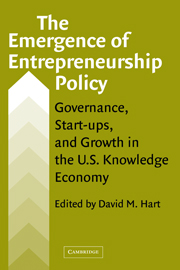 The Emergence of Entrepreneurship Policy
The Emergence of Entrepreneurship Policy Book contents
- Frontmatter
- Contents
- Editor's Acknowledgments
- Contributors
- PART ONE THE ENTREPRENEURIAL SOCIETY: WHAT'S GOVERNANCE GOT TO DO WITH IT?
- PART TWO HIGH-TECH ENTREPRENEURSHIP: THE UNIVERSITY-INDUSTRY-GOVERNMENT CONNECTION
- PART THREE EQUITY ISSUES IN ENTREPRENEURSHIP POLICY
- PART FOUR SECTOR-SPECIFIC ISSUES
- PART FIVE IMPLEMENTING ENTREPRENEURSHIP POLICY
- Afterword
- References
- Index
Afterword
Published online by Cambridge University Press: 18 December 2009
- Frontmatter
- Contents
- Editor's Acknowledgments
- Contributors
- PART ONE THE ENTREPRENEURIAL SOCIETY: WHAT'S GOVERNANCE GOT TO DO WITH IT?
- PART TWO HIGH-TECH ENTREPRENEURSHIP: THE UNIVERSITY-INDUSTRY-GOVERNMENT CONNECTION
- PART THREE EQUITY ISSUES IN ENTREPRENEURSHIP POLICY
- PART FOUR SECTOR-SPECIFIC ISSUES
- PART FIVE IMPLEMENTING ENTREPRENEURSHIP POLICY
- Afterword
- References
- Index
Summary
This volume represents a further step in the debate about U.S. competitiveness that began in the 1980s. Scholars and policymakers who have taken part in this debate too often have failed to accept the crucial role that entrepreneurship plays in generating prosperity and competitive advantage. As this volume suggests, that failure has now begun to be corrected.
The world has not stood still since the 1980s. New elements have been added to the puzzle facing policymakers concerned with entrepreneurship, even as they have grappled with challenges inherited from the past. Although the American economy is structurally sound and, indeed, rather robust from a competitiveness perspective in the medium term, some very serious issues face us over the long term. Many of these issues have to do with innovation and entrepreneurship. In the following pages, I describe these issues and I invite the reader of this volume to bear them in mind.
The first major challenge facing the United States is inequality. Despite historically low rates of unemployment in the 1990s, the gains of the extraordinary economic growth of that decade have been unevenly distributed, in ways that are heavily based on differences in education and skill. Over the last five or ten years, an individual without a college education has not gained much in terms of real weekly earnings. Even an individual with some college but no degree has lost ground. Those with less than a high school diploma have lost more ground.
- Type
- Chapter
- Information
- The Emergence of Entrepreneurship PolicyGovernance, Start-Ups, and Growth in the U.S. Knowledge Economy, pp. 260 - 264Publisher: Cambridge University PressPrint publication year: 2003
- 1
- Cited by
